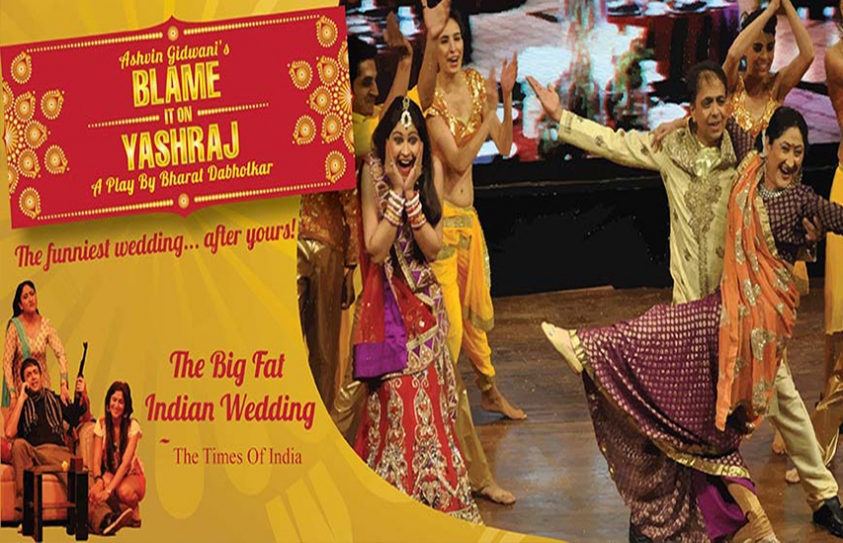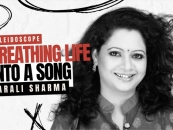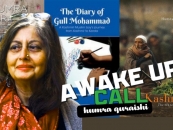Bharat Dabholkar’s Blame It On Yashraj, had its hundredth recently—making it one of the most successful English plays in recent times. This Ashvin Gidwani production has travelled extensively all over the country and several international destinations too, which goes to show that the Great Indian Wedding still hasn’t lost its grip on audiences, whether on stage or screen. It has actually been adapted as Blame It On Bollywood in some places outside India. The inter-racial/inter-religions marriage seems to be a cause if alarm in many societies, no matter how evolved they may claim to be. For an Indian audience, the band-baaja-baraat is a popular plot because it has scope for song-and-dance, romance, emotions and comedy.
Blame It On Yashraj says in a cheeky slide that Indian weddings are not just big and fat, they are obese. In Blame It On Yashraj a Hindu girl falling in love with a Muslim boy, causes a small tsunami in both families. Add to that the extravagant wedding tamasha—lorded over by a hyperactive wedding planner-- and audiences are lapping it up four years after it first opened.
The play, inspired by the Hollywood film, Father of the Bride, pokes fun at the stereotypical notions that people have of other communities. When Bandra resident, the upper class Punjabi Mr Tandon (Ananth Mahadevan) learns that his daughter (Aanchal Sachdeva) wants to marry a Muslim (Punit Tejwani), he immediately has a nightmare with a group of black-clad terrorists laying siege to his home. His Bengali wife (Jayati Bhatia) and teenage son (Neel Gagdani) seem to have no serious objections and rather enjoy all the drama.
The groom’s wealthy family are far from what Tandon imagined and it is Dabholkar’s way of teaching people not to have pre-conceived notions about other communities. The play is not meant to be a sociological study, however, and spends a lot of its run time on exuberant song (composed by Louis Banks) and dance (Hormuzd Khambata) numbers.
Dabholkar, who had started the trend of ‘Hinglish’ comedies in which characters spoke like Indians do, instead of putting on foreign accents, knows what kind of humour works with his audience—politically incorrect and sometimes risqué. In its comic way, he deals with the fear of any conservative Indian parent—what if their daughter or son falls in love with someone from another caste or religion? No matter how progressive they are, they still prefer the conventional in matters of marriage. But once the objections are dealt with and the wedding is on, then nothing can come in the way of the naach-gaana and bling.
Breaking News
- Alternative Entertainment
ALTERNATIVE ENTERTAINMENT: THE RIVER OF LIFE
0 - Kaleidoscope
KALEIDOSCOPE: ANURAG ANAND - THE STORYTELLER ARTIST
0 - Bollywood
BOLLYWOOD: CHORI MERA KAAM OR CHOR-EO-GRAPHY
0 - Business and Politics
POLITICS: SHADOW OF DOUBT ON ELECTION PROCESSES
0 - Alternative Entertainment
ALTERNATIVE ENTERTAINMENT: MAINSTREAM VS. ALTERNATIVE PERSPECTIVES
0 - Kaleidoscope
KALEIDOSCOPE: A TALE SET IN THE TIMES OF ANARCHY
0 - Bollywood
BOLLYWOOD: FRANK & FEARLESS, GULZAR…UNCUT!
0 - Thought Factory
THOUGHT FACTORY: ESCAPING THE HEAT
0 - Festivals
FESTIVALS: KASHISH PRIDE FILM FESTIVAL UNVEILS NEW LOGO
0 - Festivals
FESTIVALS: THE LOKHANDWALA STREET-CORNER START-UPS
0





-173X130.jpg)
-173X130.jpg)

-173X130.jpg)
-173X130.jpg)


